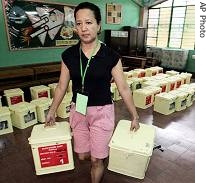2007年VOA标准英语-Filipinos to Elect New Congress, Local and Regi(在线收听)
Manila
13 May 2007
Tens of millions of Filipinos go to the polls Monday to elect the entire House of Representatives, half of the Senate, and thousands of local and regional representatives. Powerful families, money and violence have made the election campaign a typically colorful affair. But opinion polls and statements from political organizers indicate that no major power shift is expected in Congress. Douglas Bakshian reports from Manila.

Filipino woman carries ballot boxes as they prepare election paraphernalia at a distribution center in suburban Manila, 13 May 2007
Ramon Casiple, of Manila's Institute for Political and Electoral Reforms, says there are many terms that can be used to describe Philippine elections.
"Filipino elections are like a fiesta. You have all the celebrations, the money the food, it is free all around. The second term you may use is that it is the national sport. And the third term you can use is that it is all about power," said Casiple. "It is a winner-take-all type of contest. That is why Philippine elections are so intense. You can go all the way to cheating, or even killing."
In this race, a boxer, priests, and a jailed former military officer have joined established political figures as candidates in the free-for-all that is Philippine politics.
Money is flowing. Justice Secretary Raul Gonzalez has offered more than $200, a large sum for most people, to any district official in his province who delivers victory for all of the Arroyo administration's Senate candidates.
There has been serious violence, with more than 100 people killed in election-related incidents. Violence is nothing new in the Philippines, but there has been a new twist this time: in the past, election victims have tended to be political workers; this time, more than half of those killed were candidates or their relatives.
In Cebu province, mayoral candidate Rogelio Illustrisimo senior was gunned down in front of the local elections commission office. In the Abra region of Luzon, six relatives of congressional candidate Cecille Luna were shot to death in their vehicle.
Troops are backing up police in especially violent districts in an attempt to keep order.
Analyst Casiple says the Philippines is a fragile democracy run by political and economic elites. President Gloria Macapagal Arroyo is the daughter of a former president. Many Senate and House candidates are from prominent political families. Because of the strong rivalry among them, combined with disrespect for the law and massive poverty, passions tend to boil over around election time.
The opposition accuses Mrs. Arroyo of corruption and cheating in the 2004 elections, and it attempted, unsuccessfully, to impeach her last year.
This is the nation that threw out dictator Ferdinand Marcos in 1986 in a popular uprising, and ousted President Joseph Estrada in a similar movement in 2001. Experts say that spirit is still alive, but that voters have become cynical, because the recent leaders they have put in power have failed to carry out promised economic and social reforms.
Analysts say the opposition is not likely to win enough new seats to impeach Mrs. Arroyo when the new Congress convenes.
In smaller cities and municipalities, winners will be proclaimed within days, but it is expected to take about a week for the results of the House races to be announced, and two weeks for the Senate. If there are protests by losing candidates, the results could be delayed for a month or more.